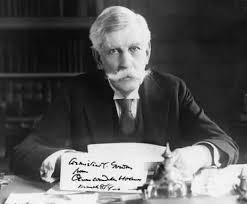
In protest of the first World War’s Espionage Act, which made almost any kind of critical or nonconformist political expression a federal crime, Holmes wrote: “but when men have realized hat time has upset many fighting faiths, they may come to believe even more than the they believe the very foundations of their own conduct that the ultimate good desired is better reached by free trade in ideas – that the best test of truth is the power of thought to get itself accepted in the competition of the market, and that truth is the only ground upon which their wishes safely can be carried out. That at any rate is the theory of our constitution. It is an experiment, as all life is an experiment. Every year if not every day we have to wager our salvation upon some prophecy based upon imperfect knowledge.” (as found in Fred Rodell: Nine Men, p. 184.)
***********************************************************************
It is something to show that the consistency of a system requires a particular result, but it is not all. The life of the law has not been logic: it has been experience. The felt necessities of the time, the prevalent moral and political theories, intentions of public policy, avowed or unconscious, even the prejudices which judges share with their fellow men, have had a good deal more to do than the syllogism in determining the rules by which men shall be governed. The law embodies the story of a nation’s development through many centuries and it cannot be dealt with as if it contained only the axioms and corollaries of a book of mathematics. In order to know what it is, we must know what it has bveen and what it tends to become.
…in substance the growth of the law is legislative…in its grounds. The very considerations which judges most rarely mention, and always with an apology, are the secret root from which the law draws all the juices of life. I mean, of course, considerations of what is expedient for the community concerned. Every important principle which is developed by litigation is in fact and at bottm the result of more or less definitely understood views of public policy…But hitherto this process has been largely unconscious. It is important, on that account, to bring to mind what the actual course of events has been. If it were only to insist on a more conscious recognition of the legislative function of the courts, as just explained, it would be useful.
…judges as well as others…openly discuss the legislative principles upon which their decisions must rest in the end, and base their judgments upon broad considerations of policy to which the traditions of the bench would hardly have tolerated areference fifty years ago. (Oliver Wendell Holmes Jr: The Common Law, 1881).
When we are dealing with words that also are a constituent act, like the Constitution of the U.S., we must realize that they have called into life a being the development of which could not have been foreseen completely by the most gifted of its begetters. It was enough for them to realize or to hope that they had created an organism; it has taken a century and has cost their successors much sweat and blood to prove that they created a nation. (252 U.S. 416, 433).
…the case before us must be considered in the light of our who national experience and not merely in that of what was said a hundred years ago. The treaty in question does not contravene any prohibitory words to be found in the Constitution. The only question is whether it is forbidden by some invisible radiation from the general terms of the Tenth Amendment. We must consider what this
The law, so far as it depends on learning, is indeed, as it has been called, the government of the living by the dead. To a very considerable extent no doubt it is inevitable that the living should be so governed. The past gives us our vocabulary and fixes the limits of our imagination; we cannot get away from it. There is, too, a peculiar logical pleasure in making manifest the continuity between what we are doing and what has been done before. But the present has a right to govern itself so far as it can; and it ought always to be remembered that historic continuity with the past is not a duty, it is only a necessity. “Learning and Science”, speech at a dinner of the Harvard Law School Association in honor of Professor C. C. Langdell (June 25, 1895); reported in Speeches by Oliver Wendell Holmes (1896). p. 67-68
*************************************************************************